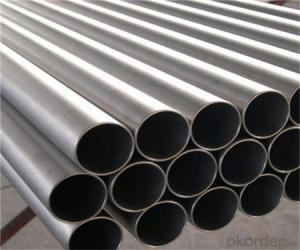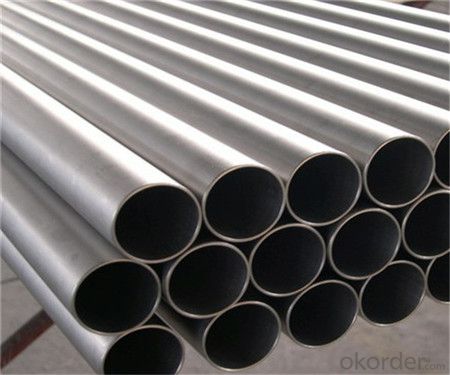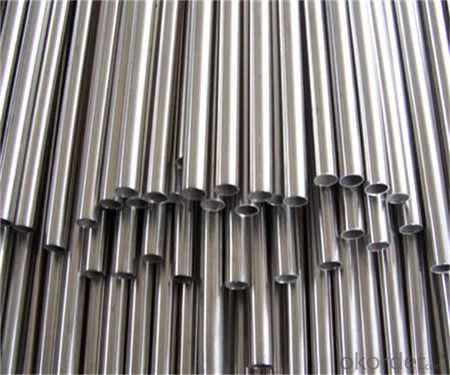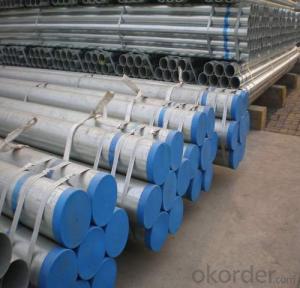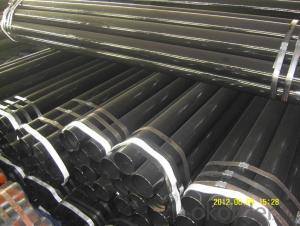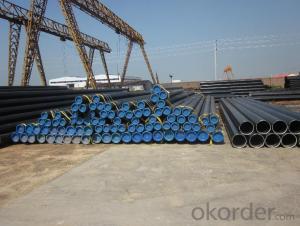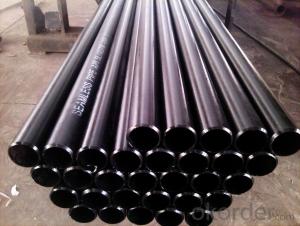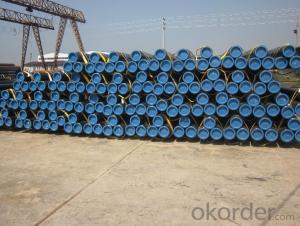China Professional Welded Steel Tube Steel Pipes manufacturer
- Loading Port:
- Tianjin
- Payment Terms:
- TT OR LC
- Min Order Qty:
- 25 m.t.
- Supply Capability:
- 9000 m.t./month
OKorder Service Pledge
OKorder Financial Service
You Might Also Like
● Full series of products provides an easier access for one stop purchase
▲ Line pipe
▲ Tubing and casing
▲ L & M & H boiler tube
▲ Gas cylinder tube & pipe
▲ Mechanical & Structural pipe
▲ Ship-building tube & pipe
▲ Automobile tube & pipe
Product Description:
1、Structure of Welded Steel Tube ASTM DIN1829:
Welded Steel Tube is formed by drawing a solid billet over a piercing rod to create the hollow shell. We are company that have many years experience and professional manager team and engineer team and sales team, sure we will provide you high quality of welded pipe and professioanl service.
2、Main Features of the Seamless Pipe ASTM DIN1829:
• High manufacturing accuracy
• The higher strength
• The small inertia resistance
• Strong heat dissipation ability
• Good visual effect
• Satisfy price
3、Seamless Pipe ASTM DIN1829 Specification:
Standard | GB, DIN, ASTM ASTM A106-2006, ASTM A53-2007 |
Grade | 10#-45#, 16Mn 10#, 20#, 45#, 16Mn |
Thickness | 8 - 33 mm |
Section Shape | Round |
Outer Diameter | 133 - 219 mm |
Place of Origin | Shandong, China (Mainland) |
Secondary Or Not | Non-secondary |
Application | Hydraulic Pipe |
Technique | Cold Drawn |
Certification | API |
Surface Treatment | factory state or painted black |
Special Pipe | API Pipe |
Alloy Or Not | Non-alloy |
Length | 5-12M |
Outer Diameter | 21.3-610mm |
Grade | 20#, 45#, Q345, API J55, API K55, API L80, API N80, API P110, A53B |
Standard | ASME, ASTM |
4、Packaging & Delivery
Packaging Details: | seaworthy package,bundles wrapped with strong steel strip |
Delivery Detail: | 15-30days after received 30%TT |
5、images of products:
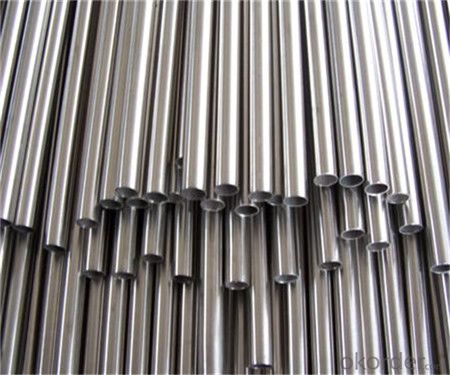
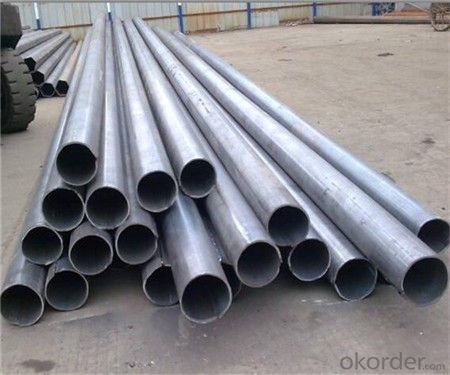
FAQ of Welded Steel Tube Steel Pipes:
①Quality
Our products are manufactured strictly according to national and internaional standard, and before delivered out we always take a test
on every pipe . If necessary we could provide our quality certifications and all kinds of testing report,.
Guaranteed: If products’ quality don’t accord to discription as we give or the promise before you place order, we promise 100% refund.
②Price
we are factory and be able to give you lowest price below market one, and we have a policy that “ for saving time and absolutely honest business attitude, we quote as lowest as possible for any customer, and discount can be given according to quantity”,if you like bargain and factory price is not low enough as you think, just don’t waste your time.Please trust the quotation we would give you, it is professional one.
Why us?
We can provide both low price and good quality especially we are belong to national company could provide you the best sell-after service .Additionally, we can also offer professional products inquiry, products knowledge train(for agents), smooth goods delivery, exellent customer solution proposals.Our service formula: good quality+good price+good service=customer’s trust
Our Advantages:
1) Fast Delivery: lot of high quality steel pipe in stock lot of factory to produce
2) Quality Assured: Strictly acc. To International standard with System ISO certification
3) Good Service: supplied professional technical guide free of charge at anytime;
4) Reasonable Price: to be better support your business;
SGS test is available, customer inspection before shipping is welcome, third party inspection is no problem.
Looking forward to doing the corporation with you
Any question, kindly feel free to contact us !
- Q: How are steel pipes used in the automotive exhaust system?
- Steel pipes are used in the automotive exhaust system to transport and expel the exhaust gases from the engine. They are durable and resistant to high temperatures, making them suitable for this purpose. Steel pipes are often bent and welded together to form the exhaust system, ensuring a smooth flow of exhaust gases and minimizing any leaks.
- Q: What is the minimum temperature that steel pipes can handle?
- The minimum temperature that steel pipes can typically handle is around -45 degrees Celsius (-50 degrees Fahrenheit).
- Q: What's the actual size of the DN25?
- Steel pipe is not only used to transport fluid and powder solid, exchange heat energy, and manufacture mechanical parts and containers, but also is an economic steel. It can reduce weight and save 20 to 40% of metal by using steel pipe to make building structure, network frame, prop and mechanical support. Moreover, it can realize factory mechanization construction. Using steel pipe to manufacture road bridge can not only save steel, simplify construction, but also greatly reduce the area of coating protective layer, save investment and maintenance cost.
- Q: What is the maximum bending radius for steel pipes?
- The maximum bending radius for steel pipes typically depends on the specific grade and diameter of the pipe, but generally, it ranges from three to five times the pipe's outer diameter.
- Q: What are the common defects found in steel pipes?
- Some common defects found in steel pipes include corrosion, cracks, pitting, scaling, and distortion.
- Q: How are steel pipes classified based on pressure ratings?
- Steel pipes are classified based on pressure ratings into various categories such as Schedule 40, Schedule 80, and Schedule 160, with each schedule indicating the maximum pressure the pipe can withstand.
- Q: How are steel pipes used in the construction of wind farms?
- Steel pipes are commonly used in the construction of wind farms to support and secure the wind turbines. These pipes serve as the foundation for the turbines, providing stability and structural integrity. They are used to create the tower structure, which supports the nacelle and rotor blades. Additionally, steel pipes are used for transporting and distributing the electrical cables within the wind farm, ensuring efficient transmission of electricity generated by the turbines.
- Q: How are steel pipes used in HVAC systems?
- Steel pipes are commonly used in HVAC systems for various purposes. They are used for transporting fluids such as water, steam, and refrigerant throughout the system. These pipes are durable and resistant to high temperatures and pressures, making them suitable for the demanding conditions of HVAC applications. They are used for distributing and circulating the heated or cooled air, as well as for connecting different components of the system, including boilers, chillers, heat exchangers, and air handlers. Additionally, steel pipes are often used for ventilation and exhaust purposes in HVAC systems.
- Q: What does carbon seamless steel pipe mean? What is the difference between a seamless 20# and an ordinary one? What is it used in detail?
- Carbon steel is relatively alloy steel. Its carbon content is higher than alloy steel, and 20# steel is one kind of carbon steel.
- Q: Are steel pipes suitable for use in mining applications?
- Yes, steel pipes are suitable for use in mining applications. Steel pipes are known for their high durability, strength, and resistance to corrosion, making them ideal for mining operations where they may be exposed to harsh conditions such as abrasive materials, high pressure, and extreme temperatures. Additionally, steel pipes can be easily welded and customized to meet specific mining requirements, making them a reliable choice for transporting fluids, gases, and materials in mining operations.
Send your message to us
China Professional Welded Steel Tube Steel Pipes manufacturer
- Loading Port:
- Tianjin
- Payment Terms:
- TT OR LC
- Min Order Qty:
- 25 m.t.
- Supply Capability:
- 9000 m.t./month
OKorder Service Pledge
OKorder Financial Service
Similar products
Hot products
Hot Searches
Related keywords
